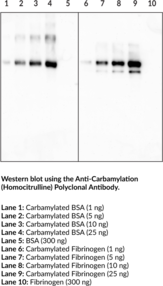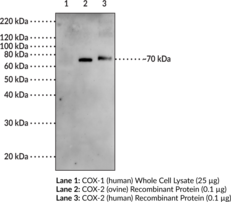Description
Cayman’s Anti-Carbamylation (Homocitrulline) Polyclonal Antibody specifically detects carbamylated proteins and does not detect the unmodified or citrullinated counterparts. It has been tested for ELISA, Immunoprecipitation, and Western blot applications. Carbamylation is the non-enzymatic and irreversible post-translational modification whereby cyanate reacts with lysine residues within polypeptide chains to generate ε-carbamyl-lysine (homocitrulline).{34533} Cyanate originates from the decomposition of urea and exists in equilibrium with its reactive form isocyanic acid.{34532} Neutrophil derived MPO mediates the conversion of isocyanate from thiocyanate at sites of inflammation.{34533,34534} Increased levels of urea associated with chronic kidney disease result in elevated cyanate concentrations, and a higher potential for carbamylated proteins.{34535} The presence of carbamylated proteins has been associated with rheumatoid arthritis.{34536} Homocitrulline residues are structurally similar to citrulline; the presence of an additional methylene group on homocitrulline being the only difference. Peptidyl arginine deiminase (PAD) mediated citrulline residues on proteins and peptides can indicate many of the same disease states as the presence of homocitrulline residues. The ability to differentiate between citrullinated and carbamylated proteins has been difficult using traditional techniques.
Synonyms: pan-Carbamylation
Immunogen: Carbamylated protein
Formulation: 500 µl of hapten affinity-purified antibody
Isotype:
Applications: ELISA, IP, and WB
Origin:
Stability: 365 days
Application|ELISA||Application|Immunoprecipitation||Application|Western Blot||Product Type|Antibodies|Polyclonal Antibodies||Research Area|Immunology & Inflammation|Autoimmunity|Rheumatoid Arthritis


